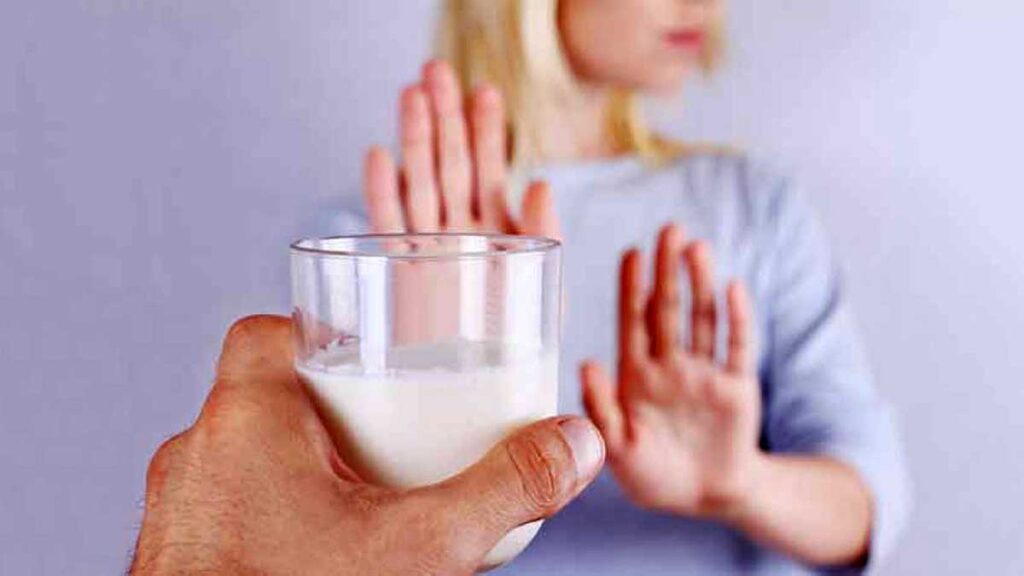
Am I lactose intolerant?
If there is a revolution in your stomach and intestines after drinking a glass of milk, it is not a bad idea to visit a doctor and adjust your diet.
What is lactose?
Lactose (also known as milk sugar) is a carbohydrate from the disaccharide group, which is mainly found in fresh milk and most dairy products.
In order for the body to absorb lactose, it must be broken down into glucose and galactose. This is thanks to the enzyme lactase, which is produced in the small intestine.
In childhood, lactase is produced in the required amount and there are no problems with the use of milk. The child grows, begins to eat other foods, and accordingly the level of lactase gradually decreases. Usually a small amount of enzyme is enough for adults to properly digest milk if it is in moderation. But in some cases, lactase production drops dramatically and problems begin. Lactase is too little to fully break down the lactose in the dairy products consumed. Milk sugar is not completely processed and is sent to the large intestine. There it appears as excess waste and disrupts the activity of the existing bacteria. Characteristic symptoms and so-called primary lactose intolerance.
This phenomenon is not something unique. It occurs in over 65% of people, and in some nationalities over 80%.
In our practice, we recommend that all adults reduce their consumption of fresh milk.
Secondary lactose intolerance occurs as a result of certain diseases, during operations on the small intestine. With it, with timely and competent measures and a proper diet, the normal state of the body can be restored. Normal as far as is expected to be age appropriate.
Quite rare, but still there is a congenital intolerance to lactose – when it is passed from generation to generation.
In infants with congenital intolerance, diarrhea occurs even from breast milk. If you do not notice the problem in time, there may be a risk to the child’s life.
Equally dangerous is secondary lactose intolerance in infants. This happened to one of our daughters as a result of treatment of a cold with antibiotics, and thank God other doctors found it in time and after feeding special milks for several months, the lactase levels recovered.
How does lactose intolerance occur?
This condition is easily suspected by the typical symptoms:
- Abdominal swelling.
- Pain or cramps in the stomach.
- Increased gas formation.
- Nausea and sometimes vomiting.
- Diarrhea.
They are also characteristic of other diseases, so it is important to understand whether the unpleasant sensations are associated with the use of fresh milk and dairy products. With lactose deficiency, symptoms are felt within 30 minutes to 2 hours after drinking a glass of fresh milk.
To know for sure that you are lactose intolerant and not something else, it is best to consult a doctor. Research methods include analysis of fecal acidity and determination of carbohydrate content in it, as well as various respiratory and other specialized tests.
If you have problems with lactose, this does not mean that you have to abandon dairy products and fresh cheeses once and for all. There are already quite a few lactose-reduced products available.
Even if you’re sure you’re lactose intolerant, that doesn’t mean you have to completely cut out all dairy products.
First, milk is one of the main sources of protein needed to build muscle. Milk contains calcium, which is necessary for bones, and potassium – it helps to keep the cardiovascular system in good condition.
Second, lactose intolerance manifests itself in different ways for different people: some get unpleasant sensations from even a very small amount of fresh milk, while others can drink a whole glass without serious consequences. Most other dairy products such as yogurt, cheese, cottage cheese, usually do not cause such a violent reaction as fresh milk.
Completely refuse dairy products only if it is really necessary and imposed by your doctor.
If not, try keeping a food diary. Record when, what and how much you ate and drank, and then how your body reacts to it. It is important to find your critical norm: it is quite possible that drinking milk in small doses will not cause you a problem, but after a few glasses and a little more you will have to not plan anything serious for the next few hours, because it is not known whether you will go on emergency to the toilet 😉.
If your body does not respond well even to milk added to coffee, try to impose a regimen with dairy products without lactose – in them, the milk sugar is already broken down during their production with lactase, they are practically no different from regular ones and contain the same vitamins and minerals. Replace fresh milk with yogurt or ayran and fresh cheese with mature. There are lactose-free mozzarellas, skirella is an even better choice because of its low fat and high protein content. We recommend yogurt with a 2% fat content (because we get plenty of fat from other places, and completely skimmed milks become that way chemically and may contain inappropriate ingredients). In general, it’s a good idea to always read the labels on any dairy products you buy.
Am I lactose intolerant?



